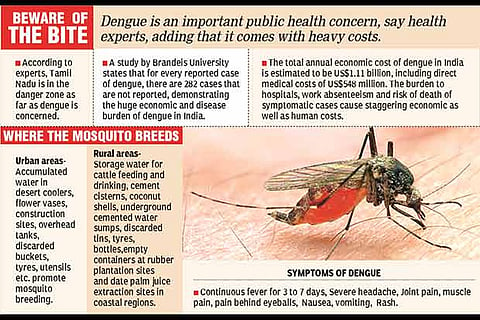

Chennai
However, experts say that the current dengue prevention and control strategy is focussed on vector control techniques and the government authorities are creating awareness and educating the population. However, in isolation, this approach has not yielded satisfactory reduction in dengue, say experts.
Dengue, a vector-borne disease, is transmitted by the female Aedes mosquito. When it bites a human, the mosquito injects the dengue virus into the host.
Educating the public
Every year, the series of steps taken to combat the diseases follows a pattern. This year, apart from the usual fogging operations and the emphasis on source reduction, the Corporation has been relying immensely on information, education and communication techniques. The programmes have been aimed at students in schools and college.
Dr TG Srinivasan, health education officer, Public Health Department, Greater Chennai Corporation, says, “Awareness messages are being sent to people on day-to-day basis, apart from educating students about the importance of source reduction. They are being made ambassadors and are taking pledge to spread the message on source reduction.”
Coaxing alone doesn’t yield results
However, given the magnitude of risk, awareness programmes can only yield limited results, points out a senior official. He says, “No amount of efforts spent on awareness alone can solve the problem. We need to have stronger implementation of laws for a complete crackdown.”
He points out that Sri Lanka recently managed to eliminate Malaria legally. He says, “Earlier they tried the same tactics _ information, education and communication. But that didn’t work. A fine of Rs 25,000 and six months of imprisonment, in case of entomological evidence of breeding ground in and around the household or business establishments, proved to be more effective. If Sri Lanka can, so can India or for that matter Tamil Nadu.”
Dr A Muruganathan, dean, Indian College of Physicians, Chennai, says a vaccine can complement the efforts. “We see efficient implementation of these control mechanisms at the community level. However, in isolation, this approach has not yielded satisfactory reduction in dengue transmission, making the implementation of a safe, efficacious and cost-effective dengue vaccine a high public health priority. The dengue vaccine can potentially augment the efforts made towards dengue prevention in the country.”
The position paper on dengue vaccine by the World Health Organisation (WHO) on 29 July, 2016 has added a new dimension to the combat, say experts. WHO recommended that countries should consider introduction of the dengue vaccine in geographic settings where epidemiological data indicate a high burden of the disease.
Visit news.dtnext.in to explore our interactive epaper!
Download the DT Next app for more exciting features!
Click here for iOS
Click here for Android